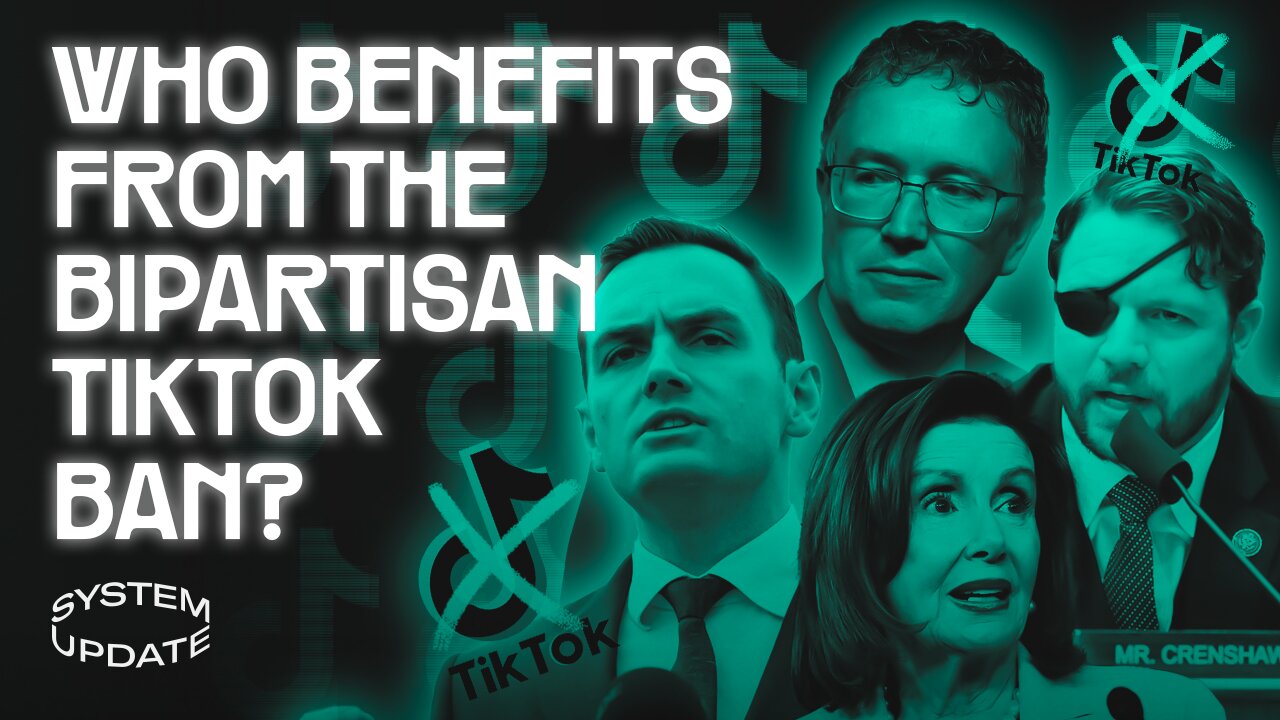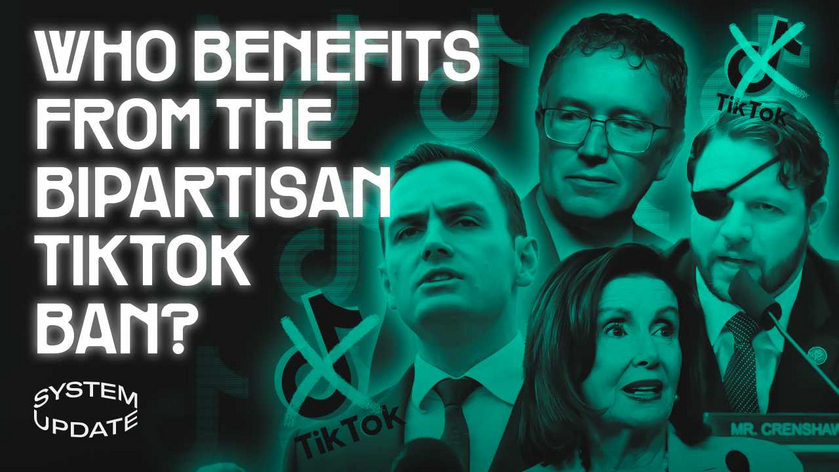Watch the full episode here:

Tonight: Whenever you've been covering events for as long as I have, it is genuinely very difficult to become truly shocked by things you see in Washington but watching what has been happening over the last week as virtually all bipartisan establishment in Washington has rapidly and even urgently united over a bill—a rather draconian bill—has actually shocked me, not only because of the speed and the mindlessness that has driven this unity in official Washington but also the widespread support outside of Washington it has generated, among numerous political factions that usually claim to be very skeptical and even adversarial to the very D.C. groups that are uniting in defense and support of this bill. Seemingly out of nowhere, overnight, the leaders of both political parties, with the sole exception of one Donald J. Trump, have decided that it is suddenly a major national priority, one of extreme urgency, to either force the extremely popular social media app TikTok to divest itself of its Chinese ownership within a very short amount of time—a corporate feat that is very difficult, if not impossible, to meet—or if they fail to do so, have American law require that Apple, Google, Amazon and all of their Big Tech megacorporations ban TikTok from operating in the United States.
The law that is moving at breakneck speed through Congress—it was just passed by the House overwhelmingly and toward the desk of Joe Biden, who has vowed to sign it the minute it hits his desk—is not just about TikTok alone. Instead, invest awesome new powers in the hands of the president to ban a wide range of social media platforms and websites that can be said to be owned by or in service to any country deemed a foreign adversary by the United States. There are so many glaring questions that ought to be immediately apparent and concerning and yet, really, very few people seem to be answering them or asking them.
To begin with, the push to ban TikTok has been lurking around Washington since at least 2020, in the Trump administration four years ago, when Trump used that threat to extract a series of concessions from TikTok about how they stored data on their American users, as well as their content moderation decisions. We've been reporting on this for a long time, including demonstrating how TikTok agreed to turn over control of American data to Oracle, and even turn over a lot of content moderation decisions to the U.S. Security State.
Calls to ban TikTok have really gone nowhere for all these years until suddenly, in the last few months, they took on a matter of great immediacy, at least as its congressional advocates tell it. Why is that? What changed in the last few months that made what seemed to be a fringe and unlikely idea, that even TikTok believed was unlikely, suddenly transform into a barreling train that seems ready to crush and roll over anyone or anything that seeks to stand in its way to implementation? Isn't that a very important question to ask? There must be something that has changed in the past few months that has rendered this bill a kind of wish list that seems very remote into a virtual inevitability overnight.
There's concrete reporting that sheds great light on that answer, reporting that is as disturbing as it is illuminating, then there is the fact that the call to ban TikTok originated with the U.S. Security State—the CIA, the FBI, the Pentagon—all of whom insisted that allowing its continuation in its current form is for some reason a grave threat to national security. But I seem to recall—don't you?—that so much of our politics over the past seven years, on both the populist right and the anti-establishment left, has been driven by grave concern over the attempt by the U.S. Security State to seize greater control over the flow of speech and information over the Internet. Remember the Twitter Files and the ensuing court rulings that the Biden administration gravely violated the First Amendment by having agencies like the CIA and the CDC coerce Big Tech platforms to censor dissent? Was I dreaming that? Where did all of that concern go about having the U.S. Security State consolidate control over our social media platforms? How is it possible that the very same factions that spent the last seven years warning shrilly of the grave dangers that come from the U.S. government controlling the flow of speech over the Internet, now suddenly want to consolidate even greater power in their hands by allowing them to seize control of the one massive social media platform used by Americans that they don't yet fully control?
The one lesson I always hoped we had learned over the past 25 years, since the beginning of the War on Terror, but so often have to reluctantly conclude that we haven't learned it is that the universal tactic used by the U.S. government when it wants to seize more power over the American population is to scare them relentlessly about some foreign threat that everyone agrees is bad, and that they hate Russia, or al-Qaida or ISIS or China, or right-wing white supremacy and premises in the U.S., all to induce people to unite around this common enemy and then agree to anything in exchange for protection from it. That's exactly what's going on here. And beyond all of that, as happened the last time when the U.S. government said it wanted to ban TikTok and then offered a bill that it said would achieve that, the bill that is now being presented goes far, far beyond that.
We'll talk later in the show to the intrepid independent reporter Michael Tracey, who has been doing a great job of closely tracking and analyzing the bill's language to understand what it actually does, which is more important than allowing politicians and media figures just to keep screaming China over and over and over until you're officially and sufficiently scared that you're willing to give up more control over online speech in the name of this scary foreign villain.
For now, welcome to a new episode of System Update, starting right now.

























